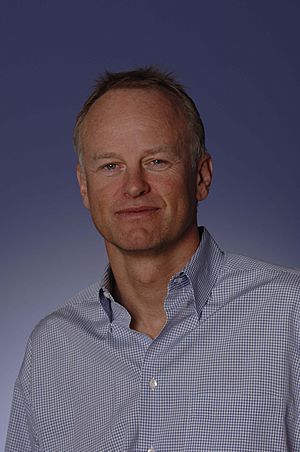Nicholas Lydon facts for kids
Quick facts for kids
Nicholas Lydon
|
|
|---|---|
 |
|
| Born | 27 February 1957 |
| Alma mater |
|
| Known for |
|
| Awards |
|
| Scientific career | |
| Institutions |
|
| Thesis | Studies on the hormone-sensitive adenylate cyclase from bovine corpus luteum (1982) |
Nicholas B. Lydon (born 27 February 1957) is a British scientist and a business person. He is famous for helping to create a very important medicine called Gleevec. This medicine changed a serious type of cancer, called chronic myeloid leukaemia (CML), from a deadly disease into a condition people can live with.
For his amazing work, he received the Lasker Clinical Award in 2009 and the Japan Prize in 2012.
Early Life and Education
Nicholas Lydon grew up in Scotland. He went to Strathallan School near Perth.
He studied biochemistry at the University of Leeds in England. Biochemistry is the study of the chemical processes that happen inside living things. He earned his first degree there in 1978.
Later, he continued his studies at the University of Dundee in Scotland. He received his PhD in biochemistry from Dundee in 1982.
Career Highlights
After finishing his studies in 1982, Lydon started working for a company called Schering-Plough in France.
Three years later, he moved to Switzerland. There, he joined Ciba-Geigy Pharmaceuticals. This is where he played a key role in developing the breakthrough cancer drug, Gleevec.
In 1997, he started his own company, Kinetex Pharmaceuticals, in Boston. Another company, Amgen, bought Kinetex in 2000. Lydon worked with Amgen until 2002.
Since then, he has started several other companies. These companies continue to work on finding new medicines for different health problems.
Awards and Recognition
Nicholas Lydon has received many important awards for his contributions to medicine. These awards recognize his work on Gleevec and its impact on treating cancer.
Some of his major awards include:
- Warren Alpert Foundation Prize, 2000.
- AACR-Bruce F. Cain Memorial Award, 2002.
- Charles F. Kettering Prize, 2002.
- The Lasker-DeBakey Clinical Medical Research Award, 2009. He shared this with Brian Druker and Charles Sawyers.
- The Japan Prize, 2012. He shared this with Brian Druker and Janet Rowley.
- Fellow of the Royal Society, 2013. This is a very high honor for scientists in the UK.
- Royal Society GlaxoSmithKline Prize and Lecture, 2014.
His work on Gleevec truly changed how doctors treat certain cancers. It showed that by targeting the specific cause of a cancer, it's possible to create medicines that are very effective and have fewer side effects. This discovery opened the door for many new cancer treatments today.
 | Lonnie Johnson |
 | Granville Woods |
 | Lewis Howard Latimer |
 | James West |

